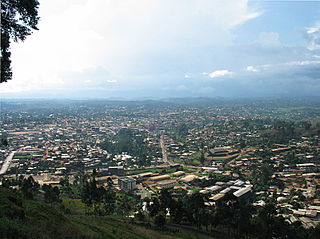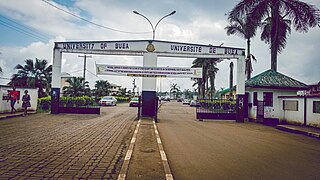
The Bakweri are a Bantu ethnic group of the Republic of Cameroon. They are closely related to Cameroon's coastal peoples, particularly the Duala and Isubu.

Ambazonia, alternatively the Federal Republic of Ambazonia or State of Ambazonia, is a political entity proclaimed by Anglophone separatists who are seeking independence from Cameroon. The separatists claim that Ambazonia should consist of the Northwest Region and Southwest Region of Cameroon. Since 2017, Ambazonian rebels have engaged in armed conflict with the Cameroonian military, in what is known as the Anglophone Crisis, attempted to set up a government-in-exile and supportive militias have exerted control over some remote regions of the claimed territory. No country has recognized Ambazonia's existence as of 2024.

Bamenda, also known as Abakwa and Mankon Town, is a city in northwestern Cameroon and capital of the Northwest Region. The city has a population of about six hundred thousand people and is located 366 km (227 mi) north-west of the Cameroonian capital, Yaoundé. Bamenda is known for its cool climate and scenic hilly location.

Cameroon is a Central African nation on the Gulf of Guinea. Bantu speakers were among the first groups to settle Cameroon, followed by the Muslim Fulani until German domination in 1884. After World War I, the French took over 80% of the area, and the British 20%. After World War II, self-government was granted, and in 1972, a unitary republic was formed out of East and West Cameroon. Until 1976 there were two separate education systems, French and English, which did not merge seamlessly. English and French are now considered the primary languages of instruction with English being more preferred. Local languages are generally not taught as there are too many, and choosing between them would raise further issues.

Limbé or Limbe is a seaside city in the South-West Region of Cameroon, At the 2005 Census, the population was 84,223.

Buea is the capital of the Southwest Region of Cameroon. The city is located in Fako Division, on the eastern slopes of Mount Cameroon, and has a population of about 800.000 inhabitants as of 2023. It has two Government Hotels, the Mountain Hotel and Parliamentarian Flats Hotel located around The Government Residential Area.

Cameroonian Pidgin English, or Cameroonian Creole, is a language variety of Cameroon. It is also known as Kamtok. It is primarily spoken in the North West and South West English speaking regions. Five varieties are currently recognised:

The Subu are a Bantu ethnic group who inhabit part of the coast of Cameroon. Along with other coastal peoples, they belong to Cameroon's Sawa ethnic groups. They were one of the earliest Cameroonian peoples to make contact with Europeans, and over two centuries, they became influential traders and middlemen. Under the kings William I of Bimbia and Young King William, the Isubu formed a state called Bimbia.

The Bakole are a Bantu ethnic group of the Republic of Cameroon. They belong to the Sawa, or Cameroonian coastal peoples. The Bakole speak a language of the same name.
Camfranglais, Francanglais, or Francamglais is a vernacular of Cameroon, containing grammatical and lexical elements from Cameroonian French, Cameroonian English and Cameroonian Pidgin English, in addition to lexical contributions from various indigenous languages of Cameroon.

University of Buea (UB) is found in Molyko, Buea, in the southwest region of Cameroon. It was founded as a university centre in 1985 and became a full-fledged university in 1992, following a government decree that re-organized state universities in the country. It is regarded as the best university in Cameroon and is one of two English speaking universities in Cameroon, alongside the University of Bamenda, which follow the British system of education. It serves citizens from both anglophone and francophone regions of Cameroon and from neighboring countries such as Nigeria and Equatorial Guinea.

The 2016–2017 Cameroonian protests were a series of protests that occurred following the appointment of Francophone judges in English-speaking areas of the Republic of Cameroon. In October 2016, protests began in two primarily English-speaking regions: the Northwest Region and the Southwest Region.

The Anglophone Crisis, also known as the Ambazonia War or the Cameroonian Civil War, is an ongoing armed conflict in the English-speaking Northwest and Southwest regions of Cameroon between the Cameroonian government and Ambazonian separatist groups, part of the long-standing Anglophone problem. Following the suppression of 2016–17 protests by Cameroonian authorities, separatists in the Anglophone regions launched a guerrilla campaign and later proclaimed independence. Within two months, the government of Cameroon declared war on the separatists and sent its army into the Anglophone regions.
This is a timeline of the Anglophone Crisis during 2018.
This is a timeline of the Anglophone Crisis during 2019.
This is a timeline of the Anglophone Crisis during 2020.
The Kumba school massacre took place at Mother Francisca International Bilingual Academy during the Anglophone Crisis, in Kumba, Cameroon, in October 2020.
This is a timeline of the Anglophone Crisis in Cameroon during 2022.
This is a timeline of the Anglophone Crisis in Cameroon during 2023.
Local Youth Corner Cameroon (LOYOC) is a Cameroonian non-governmental organization founded in 2002 to react on the increase in the socio-political and economic challenges facing young people. LOYOC focuses on youth empowerment in the domain of peacebuilding, healthy living, preventing and countering violent extremism.











